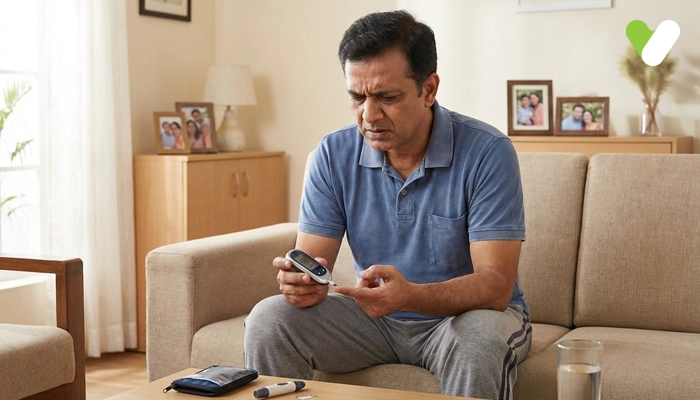Ankur is a middle-aged man. He comes from a family of hereditary diabetics. He is very cautious about his sweet intake and regularly checks his sugar levels. For the past one month, he has suddenly gained his hunger power and gets thirsty frequently. He knew the symptoms of diabetes hence got worried. The very next free weekend he had, he went for a test. Sadly his speculation was correct, but the good thing is that the levels are just above the line, and if taken precautions and if medicines are taken regularly, it can be controlled.
Suitable for Ankur; he knew the signs of diabetes. Before growing and coming to its complete form, every disease gives some signs named as symptoms. It is essential to know the symptoms of major diseases and conditions to identify them in their early stages.
Let’s have a look at the symptoms of diabetes.
What is Diabetes?
Diabetes happens when the blood sugar in your body is too high. It occurs when the pancreas doesn't function properly and stops sending out hormones that control the amount of sugar present in your bloodstream.Types of Diabetes
There are two types of diabetes, namely,Type 1 diabetes is a chronic autoimmune condition that is usually diagnosed in childhood or the age of adolescence. It is associated with low blood sugar. Type 1 diabetes gives common blood sugar symptoms.
Type 2 diabetes usually develops in adulthood. It happens when the body stops responding to insulin, a hormone secreted and produced by the pancreas responsible for managing sugar in the bloodstream. It is associated with high blood sugar. Type 2 diabetes gives high blood sugar symptoms.
Common early warning signs of diabetes
Some of the symptoms of diabetes for type 1 diabetes and type 2 diabetes are the same, and some signs of diabetes are different.
Following are some of the general warning signs of diabetes –
- Extreme thirst
- Sudden and unintentional weight loss
- Frequent urination happens, especially at night
- Vision blurriness
- Fatigue
- Dry skin and itchy skin
- A feeling of numbness or tingling in hands and feet
- Increased hunger
- Wounds won’t heal quickly
It is recommended by the Centers for Disease Control and Prevention (CDC) that if one sees any of the symptoms mentioned above of diabetes, then they should immediately contact a doctor and take tests.
If diabetes is treated in the early stages, it will heal completely. But ignoring the symptoms and sitting on them will worsen the symptoms over time as chronically high blood sugars do more damage to the body.
Warning signs of type 1 diabetes
It is seen that low blood sugar symptoms develop quicker than high blood sugar symptoms. It takes only a few weeks or months to develop signs of diabetes of type 1. This type 1 diabetes is generally diagnosed in children aged between 4 years to 6 years and 10 years to 14 years.Children suffering from type 1 diabetes will experience the following low blood sugar symptoms-
- Sudden and unintentional weight loss
- Sudden bedwetting problems after a history of being dry at night
- Yeast infection in a prepubescent girl
- breath that smells fruity
- nausea
- vomiting
- loss of consciousness
- breathing problems
Warning signs of type 2 diabetes
It is seen that high blood sugar symptoms tend to come more gradually than low blood sugar symptoms. It takes several years for signs of diabetes for type 2 to develop. Many a time, the signs are subtle. It can be almost undetectable on your own.Following are the symptoms of diabetes of type 2 –
- hunger
- thirst
- fatigue
- immunosuppression
- infections
- blurry vision
- diabetic neuropathy
Diagnosis of Diabetes
More frequently, people get themselves tested for diabetes when they start to see the sudden developments of the symptoms.The low blood sugar symptoms are different from the high blood sugar symptoms. When one feels these symptoms developing and growing the body, one must see a doctor without hesitating. Your doctor might want to know your symptoms, family history, medicines you are taking currently, and whether you have any allergies. After listening to these, your doctor will write down some tests for you to take.
Following are the tests that can diagnose diabetes-
- A1C: This test takes out the average of your blood sugar for the last 2-3 months. This doesn’t require you to fast or drink anything.
- Fasting plasma glucose: before taking this test, you will have to fast for about 8 hours.
- Oral glucose tolerance: in this test, your glucose levels are tested several times at certain time intervals for 2 hours after you have consumed a specific sweet drink. This test takes about 2 to 3 hours to get done with.
- Random plasma glucose test: this test needs no fasting. It can be done at any time randomly.
